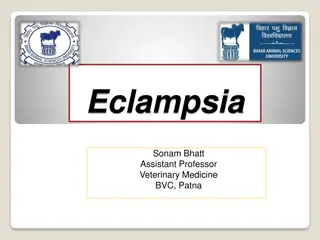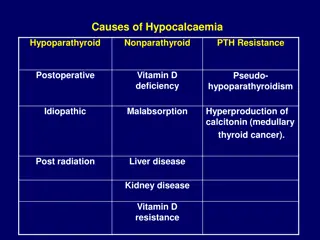Tetanus: Causes, Symptoms, and Diagnosis
Tetanus, also known as Locked Jaw or Saw Horse disease, is a highly fatal condition in domestic animals caused by the neurotoxin produced by Clostridium tetani. The disease is characterized by hyperaesthesia, tetany, and convulsions. Transmission occurs through contaminated soil, typically from hors
0 views • 10 slides
Magnesium Metabolism and Hypomagnesaemia
Magnesium, mainly an intracellular ion, plays a crucial role in enzyme function and cell membrane stability. Its renal handling involves filtration and reabsorption, with hypomagnesaemia often linked to hypocalcaemia. Causes include inadequate intake, excessive losses from GI and urinary sources, an
0 views • 17 slides
Eclampsia in Dogs: Causes, Symptoms, Diagnosis, and Treatment
Eclampsia is an acute, life-threatening condition that affects small bitches with large litters post-whelping. It is characterized by panting, tremors, muscle spasms, and tetany due to hypocalcemia. Diagnosis involves history, clinical signs, and serum calcium levels. Treatment includes slow IV admi
0 views • 8 slides
Hypocalcemia and Related Conditions
Hypocalcemia can be caused by various factors such as hypoparathyroidism, nonparathyroid conditions, and postoperative complications. Symptoms include muscle tetany, paresthesia, and seizures. Conditions like pseudohypoparathyroidism and congenital hypoparathyroidism also contribute to calcium imbal
0 views • 31 slides
Calcium Homeostasis and Its Importance in the Body
Calcium homeostasis plays a crucial role in various physiological functions, including bone integrity, blood clotting, enzymatic regulation, hormonal secretion, neurotransmitter release, nerve excitability, and muscle contraction. Bones act as a major calcium reservoir, with blood containing 50% ion
0 views • 17 slides
Eclampsia in Bitches: Causes and Symptoms
Eclampsia in bitches, also known as lactation tetany or milk fever, is a condition that can occur in the later stages of pregnancy or during lactation. Common in small breeds like Spitz, this disease presents symptoms such as restlessness, panting, and muscle stiffness. The exact causes are not defi
0 views • 11 slides





